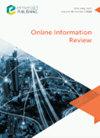Understanding Shadow IT usage intention: a view of the dual-factor model
IF 3.1
3区 管理学
Q2 COMPUTER SCIENCE, INFORMATION SYSTEMS
引用次数: 0
Abstract
Purpose Despite the growing concern about security breaches and risks emerging from Shadow IT usage, a type of information security violation committed by organizational insiders, this phenomenon has received little scholarly attention. By integrating the dual-factor theory, unified theory of acceptance and use of technology (UTAUT) and social control theory, this research aims to examine facilitating and deterring factors of Shadow IT usage intention. Design/methodology/approach An online survey was performed to obtain data. As this study aims at investigating the behavior of organizational insiders, LinkedIn, an employment-oriented network site, was chosen as the main site to reach the potential respondents. Findings The results show that while performance expectancy, effort expectancy and subjective norms considerably impact intention to use Shadow IT, personal norms and sanctions-related factors exert no influence. Besides, an organizational factor of ethical work climate is found to significantly increase individual perceptions of informal controls and formal controls. Originality/value This work is the first attempt to extend the generalizability of the dual-factor theory and UTAUT model, which primarily has been utilized in the context of system usage, to the new context of information security. This study is also one of few studies that simultaneously take both organizational and individual factors into consideration and identify its impacts on user's behaviors in the information security context.理解影子IT使用意图:双因素模型的观点
尽管人们越来越关注来自影子IT使用的安全漏洞和风险,这是组织内部人员所犯的一种信息安全违规行为,但这一现象很少受到学术界的关注。本研究通过整合双因素理论、技术接受与使用统一理论(UTAUT)和社会控制理论,探讨影子IT使用意愿的促进因素和阻碍因素。设计/方法/方法进行在线调查以获取数据。由于本研究的目的是调查组织内部的行为,LinkedIn,一个就业导向的网络网站,被选为主要网站,以达到潜在的受访者。结果表明,绩效期望、努力期望和主观规范对影子IT使用意愿有显著影响,而个人规范和制裁相关因素对影子IT使用意愿没有影响。此外,道德工作氛围的组织因素显著增加了个人对非正式控制和正式控制的感知。本文首次尝试将双因素理论和UTAUT模型的通用性从系统使用的语境扩展到信息安全的新语境。本研究也是为数不多的同时考虑组织和个人因素并确定其对信息安全背景下用户行为影响的研究之一。
本文章由计算机程序翻译,如有差异,请以英文原文为准。
求助全文
约1分钟内获得全文
求助全文
来源期刊

Online Information Review
工程技术-计算机:信息系统
CiteScore
6.90
自引率
16.10%
发文量
67
审稿时长
6 months
期刊介绍:
The journal provides a multi-disciplinary forum for scholars from a range of fields, including information studies/iSchools, data studies, internet studies, media and communication studies and information systems.
Publishes research on the social, political and ethical aspects of emergent digital information practices and platforms, and welcomes submissions that draw upon critical and socio-technical perspectives in order to address these developments.
Welcomes empirical, conceptual and methodological contributions on any topics relevant to the broad field of digital information and communication, however we are particularly interested in receiving submissions that address emerging issues around the below topics.
Coverage includes (but is not limited to):
•Online communities, social networking and social media, including online political communication; crowdsourcing; positive computing and wellbeing.
•The social drivers and implications of emerging data practices, including open data; big data; data journeys and flows; and research data management.
•Digital transformations including organisations’ use of information technologies (e.g. Internet of Things and digitisation of user experience) to improve economic and social welfare, health and wellbeing, and protect the environment.
•Developments in digital scholarship and the production and use of scholarly content.
•Online and digital research methods, including their ethical aspects.
 求助内容:
求助内容: 应助结果提醒方式:
应助结果提醒方式:


